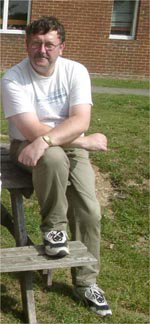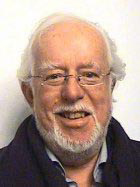

Neil Bone, who worked as a researcher in Biochemistry for 20 years, died on 23 April after a long battle with cancer, faced throughout with courage and his distinctive sense of humour.
Neil studied in Edinburgh, and worked there and in Cambridge, before moving to Sussex in 1989 to work with Dr Julian Burke in the Biochemistry division.
In 1992 he joined my group, and worked there for a series of projects supported by the Cancer Research Campaign, the Wellcome Trust and the Medical Research Council.
Neil's original background was in molecular biology, but he also became an expert in microscopy and helped pioneer the use of advanced techniques in the School. Countless undergraduate and postgraduate students were instructed in these methods by Neil, indoctrinated in his mantra of "an experiment is only as good as its controls".
They were also bemused by his elliptical references to the sinister conspiracy that prevented Heart of Midlothian from achieving their rightful honours in Scottish football. Indeed, it was in their strip that he impressed fellow players with his unusual, but generally effective, techniques on the Unihoc pitch.
Neil also had a remarkable parallel career in astronomy, writing and contributing to several books and many periodicals, giving popular talks around the country and informing the media about astronomical events.
In recognition of his substantial contributions, in February 2009 the International Astronomical Union conferred the major honour of naming an asteroid after Neil. Minor planet (7102) Neilbone, to give it its new name, will be a lasting memorial. The colour of this celestial object is not known, but it would be nice to think it is Heart of Midlothian maroon.
Dr John Armstrong, Biochemistry

Professor Tom Whiston, who died on 11 April, was an advocate of interdisciplinarity who started his academic life as a chemist, switched to cognitive psychology and then became a respected expert in science and technology policy.
He took the position that "academic disciplines are arbitrary and misleading" and that "we impose mental structures which are artificial, indeed arbitrary".
Tom left Manchester University in 1976 to take up a Senior Research Fellowship at SPRU - Science and Technology Policy Research.
Much of his work at SPRU was concerned with critiques of social, educational and global forecasting and he edited the text Uses And Abuses of Forecasting.
Tom published over 150 books, book chapters, monographs, research council and government reports, journal articles and conference reports on a wide variety of topics - especially education policy, environmental policy and systems structures.
Among some of the more important work, he was asked to research and develop a completely new higher education and research policy agenda for South Africa following the fall of apartheid. This was published in 1994.
In 1992 Tom led a large international collaborative research endeavour sponsored by the European Union, which addressed global sustainability and the combined technological, educational and political agenda that the world should address. This work was published in 23 volumes as Global Perspective 2010 tasks for science and technology.
In 1998 he was appointed to the chair of environmental regulation at Roskilde University in Denmark, which he occupied for the next decade. He became an honorary professor at Sussex.
After being diagnosed with cancer last autumn, Tom had been trying to finish three books. Professor Gordon MacKerron, director of SPRU, said: "He was a specialist in many different fields. He had tremendous energy and vigour right through his illness. It is a very substantial loss. Had he lived he would have made many more contributions."